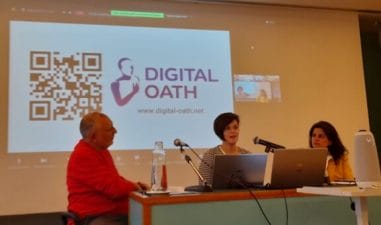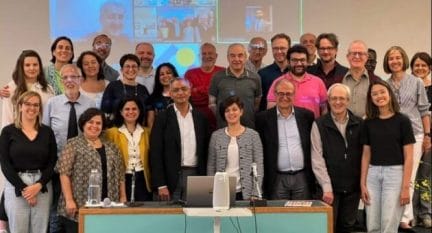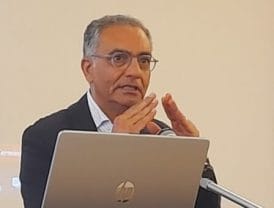The level reached by artificial intelligence poses new ethical questions: how can technological development be progressed on a human scale? A Call to Action for developers and innovators in the digital world. A horizon that concerns us all. June 2023, Sophia University Institute: on the screen of the Aula Magna a digital hostess elegantly opens the seminar “Towards a Digital Oath”. We are crossing a threshold: the preparation began a long time ago, but the acceleration of recent times says something new.  Promoted by a platform of protagonists: the Sophia Global Studies Research Centre, the Political Movement for Unity, NetOne, New Humanity and Digital Oath, the aim of the seminar is to address the pressing issues of the digital world according to different perspectives: philosophical, technological, ethical, social and political, leading up to a discussion about the proposal of an “oath”, that for professionals in the digital world would be equivalent to the Hippocratic Oath for doctors. Where does this idea come from? What are the goals? The technological world tends to change rapidly, faster than our ability to adapt. The complexity of the machines and systems that structure reality affects not only the way we live, but also the way we see the world and think about the future. The level reached by “AI – artificial intelligence”, alongside enthusiasm for its operational capabilities, presents a general concern about the new possibilities being opened up by these systems and the effects that can result from their malicious use. The recent spread of ChatGPT (November 2022) and all its spin-offs has brought AI massively closer to our daily lives, giving rise to new questions of meaning related to the understanding of what is human and what is not. In the world panorama, the evolution of these devices has produced a kind of disorientation, not only because their use appears within the reach of everyone, but above all because they
Promoted by a platform of protagonists: the Sophia Global Studies Research Centre, the Political Movement for Unity, NetOne, New Humanity and Digital Oath, the aim of the seminar is to address the pressing issues of the digital world according to different perspectives: philosophical, technological, ethical, social and political, leading up to a discussion about the proposal of an “oath”, that for professionals in the digital world would be equivalent to the Hippocratic Oath for doctors. Where does this idea come from? What are the goals? The technological world tends to change rapidly, faster than our ability to adapt. The complexity of the machines and systems that structure reality affects not only the way we live, but also the way we see the world and think about the future. The level reached by “AI – artificial intelligence”, alongside enthusiasm for its operational capabilities, presents a general concern about the new possibilities being opened up by these systems and the effects that can result from their malicious use. The recent spread of ChatGPT (November 2022) and all its spin-offs has brought AI massively closer to our daily lives, giving rise to new questions of meaning related to the understanding of what is human and what is not. In the world panorama, the evolution of these devices has produced a kind of disorientation, not only because their use appears within the reach of everyone, but above all because they  demonstrate that they do something that was previously the prerogative of human beings, with quantitatively superior capacities. The fact that we are faced with systems that are not “intelligent” in the human sense of the term and that manage their knowledge base through statistical calculations does not change the final result: the feeling of no longer being the authors of fundamental choices, of being challenged by machines that are less like “tools” and more like “colleagues”. The “Towards a Digital Oath” seminar added an important theme to these issues which is that questioning the ethics of technologies means questioning what is human. Many people consider technological development as the human activity that characterizes us most. Digital technologies, and in particular AI, are those that most accurately reflect our way of being and of understanding our existence. The crises of the last century (of values, environmental, social and political) are closely related to them and indicate that technological development must be accompanied by an equally determined educational commitment, so that every form of progress can be guided by a deeper ethical awareness. The “oath” for the digital world goes precisely in this direction. The programme of the first days of June convened a range of experts (link to the programme). After an initial broad overview of today’s digital technologies, the discussion explored the risks and regulations related to their use in Italy, the EU, the US, Brazil and China, intertwining technological solutions with political issues, philosophical reflections and social phenomena.
demonstrate that they do something that was previously the prerogative of human beings, with quantitatively superior capacities. The fact that we are faced with systems that are not “intelligent” in the human sense of the term and that manage their knowledge base through statistical calculations does not change the final result: the feeling of no longer being the authors of fundamental choices, of being challenged by machines that are less like “tools” and more like “colleagues”. The “Towards a Digital Oath” seminar added an important theme to these issues which is that questioning the ethics of technologies means questioning what is human. Many people consider technological development as the human activity that characterizes us most. Digital technologies, and in particular AI, are those that most accurately reflect our way of being and of understanding our existence. The crises of the last century (of values, environmental, social and political) are closely related to them and indicate that technological development must be accompanied by an equally determined educational commitment, so that every form of progress can be guided by a deeper ethical awareness. The “oath” for the digital world goes precisely in this direction. The programme of the first days of June convened a range of experts (link to the programme). After an initial broad overview of today’s digital technologies, the discussion explored the risks and regulations related to their use in Italy, the EU, the US, Brazil and China, intertwining technological solutions with political issues, philosophical reflections and social phenomena.  Fadi Chehadé, former CEO of ICANN (Internet Corporation for Assigned Names and Numbers), promoter of the “oath” for an ethics of the digital world and visiting professor at the Sophia Institute, said, “We need to make a concrete and universally shared commitment to which developers, technicians and users of digital technologies can adhere and firmly anchor their work on a human centred approach”. Fadi Chehadé has been involved in this project since November 2019, when the first group met in Trent (Italy) to shape the project. Subsequently, the group involved scholars in various countries and participated in the UN-sponsored public consultation for the Global Digital Compact 2024. The purpose of the Digital Oath is precise: to suggest guidelines and ethically motivate developers and innovators of the digital world to put the dignity and quality of life of people and communities, the sense of human existence and respect for fundamental rights and the environment, at the centre. The proposal to “translate” the Hippocratic Oath for the digital world has already emerged in various international studies, which underline the urgency of the issue and the responsibility of those who create and manage digital services and administer data. It includes not only the new neural networks but also social networks and cryptocurrencies. Our work adds to that of other networks: now we need to join forces to establish a coalition between universities, the private sector and organizations committed to writing a code of ethics, a self-regulatory protocol that can benefit people, society and the environment. There is an initial wording of the oath on the new Digital Oath website and it is attracting support; suggestions and changes to the text are welcome and it will be progressively developed. The recordings and documents of the Seminar will soon be available on the website. The road is certainly uphill but there are many of us on the journey: it is a horizon that concerns us all.
Fadi Chehadé, former CEO of ICANN (Internet Corporation for Assigned Names and Numbers), promoter of the “oath” for an ethics of the digital world and visiting professor at the Sophia Institute, said, “We need to make a concrete and universally shared commitment to which developers, technicians and users of digital technologies can adhere and firmly anchor their work on a human centred approach”. Fadi Chehadé has been involved in this project since November 2019, when the first group met in Trent (Italy) to shape the project. Subsequently, the group involved scholars in various countries and participated in the UN-sponsored public consultation for the Global Digital Compact 2024. The purpose of the Digital Oath is precise: to suggest guidelines and ethically motivate developers and innovators of the digital world to put the dignity and quality of life of people and communities, the sense of human existence and respect for fundamental rights and the environment, at the centre. The proposal to “translate” the Hippocratic Oath for the digital world has already emerged in various international studies, which underline the urgency of the issue and the responsibility of those who create and manage digital services and administer data. It includes not only the new neural networks but also social networks and cryptocurrencies. Our work adds to that of other networks: now we need to join forces to establish a coalition between universities, the private sector and organizations committed to writing a code of ethics, a self-regulatory protocol that can benefit people, society and the environment. There is an initial wording of the oath on the new Digital Oath website and it is attracting support; suggestions and changes to the text are welcome and it will be progressively developed. The recordings and documents of the Seminar will soon be available on the website. The road is certainly uphill but there are many of us on the journey: it is a horizon that concerns us all.
Andrea Galluzzi




0 Comments